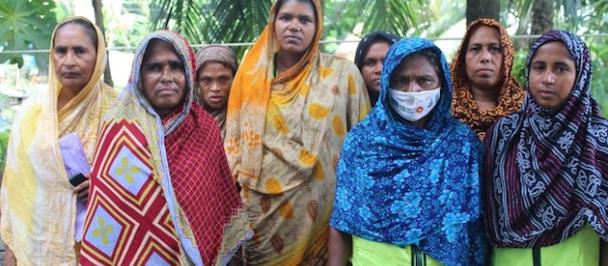Crisscrossed by the rivers Rupsha and Chunkuti, Dacope Upazila is located on the southwestern coast of Bangladesh in the Khulna district. Despite battling countless natural disasters over the years, the people of Dacope persisted. However, the increasing rate of cyclones, thunderstorms and flooding is creating long-lasting problems in the region, which is already one of the most climate-vulnerable in the country. The majority of the coastal people depend largely on natural resources for economic survival. As resources get depleted or destroyed due to calamities, so do their livelihoods which pushes them into deeper pockets of poverty.
Rikta Roy, a resident of Tildanga Union of Dacope Upazila, had long been struggling to find a stable source of income.
“Storms, cyclones and salinity levels in water have increased over the years. This largely disrupted my livelihood,” said Rikta. She had started rearing chickens and ducks with high hopes of selling the poultry eggs for a profit. But the cyclone Amphan in May 2020 destroyed these hopes as it swept away the small poultry farm, which was Rikta’s only source of income. She could not even catch fish as the ponds were too saline.
Rikta and her fellow coastal women are particularly vulnerable to the adverse impacts of climate change. The women are typically in charge of collecting water and ensuring nutrition for their families, but freshwater sources are dwindling due to increased salinity. Meanwhile, the salinity of the soil makes it difficult for them to rear animals and grow crops and vegetables. Men in the area frequently migrate from the coasts, leaving women with the extra burden of sustaining their families and generate an income.
Coastal women are often left behind from capacity-building and education activities, so they remain ill-equipped to ensure their safety during natural disasters. They are the hardest-hit demographic during cyclones and storms, falling into a vicious cycle of poverty and vulnerability aggravated by climate change.
In order to break this cycle, United Nations Development Programme (UNDP), undertook the Local Government Initiative on Climate Change (LoGIC) project, led by the Local Government Division (LGD) of the Ministry of Local Government, Rural Development, and Cooperatives. It is also supported by the United Nations Capital Development Fund (UNCDF), Swedish International Development Cooperation Agency (SIDA) and the European Union (EU). LoGIC is promoting local-led climate-adaptive livelihoods by providing a Community Resilience Fund (CRF) to vulnerable climate women.
A survey undertaken by LoGIC profiled the most climate-vulnerable women in Dacope Upazila, where Rikta and other members got enlisted. The women were divided into smaller groups where each member received a CRF of USD 340 (approximately BDT 29,000) as direct support to undertake climate adaptative livelihoods with immediate benefits for their income. LoGIC established a co-financing mechanism where these women contributed USD 58 (approx. BDT 5,000) from their personal funding to ensure strong ownership of the community and beneficiaries for sustainability. Working with local government authorities, agricultural officers, and community mobilisation facilitators, LoGIC supported these groups through every step of the implementation process -- planning, financing, climate-adaptive business model formulation, and land leasing for cultivation. The project also provided training on watermelon cultivation, created access to financial institutions, and established market linkages for these women.
“I spent my days ploughing land, watering seeds, using fertilisers and pesticides when necessary. The cultivation period lasted around three months. Finally, when the watermelons were ready, the project helped us connect with retailers for sale,” said Rikta.

Between March to May 2021, LoGIC has supported over 200 women in watermelon cultivation in Dacope. The women invested $46000 in production and gained a total profit of $90000. This is just one of the many schemes of the LoGIC project. “We sold watermelon at a double profit, and with these savings, we will do cultivation in the upcoming season,” said Rikita. LoGIC is supporting over 3,000 beneficiaries in Khulna to take their first step towards sustainable livelihoods. Coastal women are looking forward to the upcoming season to cultivate pumpkin, cucumber, corn, and sunflowers. These vegetables will not only earn them a profit but also provide nutrition for their families.
UNDP’s LoGIC project has embraced a true grassroots approach to build the capacities of the lowest tier of government (Union Parishads) in Bangladesh. Union Parishads are improving their plans to be more gender-inclusive and climate-adaptive while emphasising a community-led approach to decision-making and local governance.
By 2023, LoGIC aims to support about 4,00,000 vulnerable households in 72 unions of seven districts -- Khulna, Sunamganj, Kurigram, Bagerhat, Barguna, Patuakhali and Bhola.
Ensuring that sustainable development happens from the grassroots level is key to achieving the global goals by 2030. By sowing the seeds of resilience in the most climate-vulnerable demographic of Bangladesh, LoGIC aims to instil the values of the SDGs among left-behind communities and help them rise out of climate vulnerability.

 Locations
Locations



